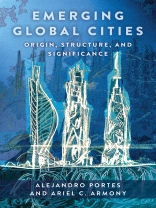Certain cities—most famously New York, London, and Tokyo—have been identified as “global cities, ” whose function in the world economy transcends national borders. Without the same fanfare, formerly peripheral and secondary cities have been growing in importance, emerging as global cities in their own right. The striking similarity of the skylines of Dubai, Miami, and Singapore is no coincidence: despite following different historical paths, all three have achieved newfound prominence through parallel trends.
In this groundbreaking book, Alejandro Portes and Ariel C. Armony demonstrate how the rapid and unexpected rise of these three cities recasts global urban studies. They identify the constellation of factors that allow certain urban places to become “emerging global cities”—centers of commerce, finance, art, and culture for entire regions. The book traces the transformations of Dubai, Miami, and Singapore, identifying key features common to these emerging global cities. It contrasts them with “global hopefuls, ” cities that, at one point or another, aspired to become global, and analyzes how Hong Kong is threatened with the loss of this status. Portes and Armony highlight the importance of climate change to the prospects of emerging global cities, showing how the same economic system that propelled their rise now imperils their future. Emerging Global Cities provides a powerful new framework for understanding the role of peripheral cities in the world economy and how they compete for and sometimes achieve global standing.
Spis treści
Acknowledgments
Introduction
Part I
1. The Role of Cities in the Capitalist Economy: An Overview
2. Dubai: From Marginal Gulf Town to Regional Hub, by Rana Tomaira
3. Miami: From Winter Resort to Hemispheric Capital, with the collaboration of Brandon P. Martinez
4. Singapore: From Fishing Village to World-Class Metropolis, with the collaboration of Larry Liu
Part II
5. Global Hopefuls: An Overview
6. New Orleans: A Century of Decline, with the collaboration of Larry Liu
7. São Paulo: Brazil’s Always-Aspiring City, with the collaboration of Rosa Hassan De Ferrari and Anthony Ocepek
8. Lagos: Africa’s New Dubai?, with the collaboration of Rosa Hassan De Ferrari and Anthony Ocepek
Part III
9. Hong Kong: A Threatened Global City, by Larry Liu
Conclusion: Theoretical Implications, Climate Change, and Future Challenges
Notes
References
Index
O autorze
Alejandro Portes is professor of law and distinguished scholar of arts and sciences at the University of Miami. He is the Howard Harrison and Gabrielle S. Beck Professor of Sociology (emeritus) and the founding director of the Center for Migration and Development at Princeton University. Portes is also a member of the National Academy of Sciences and the former president of the American Sociological Association. His books include City on the Edge: The Transformation of Miami (1993) and Immigrant America: A Portrait (fourth edition, 2014).Ariel C. Armony is vice chancellor for global affairs and director of the University Center for International Studies at the University of Pittsburgh, where he is also a professor in the Graduate School of Public and International Affairs. He was a fellow at the Woodrow Wilson International Center for Scholars, a Fulbright scholar at Nankai University, and a resident fellow at the Rockefeller Foundation Bellagio Center. His publications include The Dubious Link: Civic Engagement and Democratization (2004) and, with Portes, The Global Edge: Miami in the Twenty-First Century (2018).












